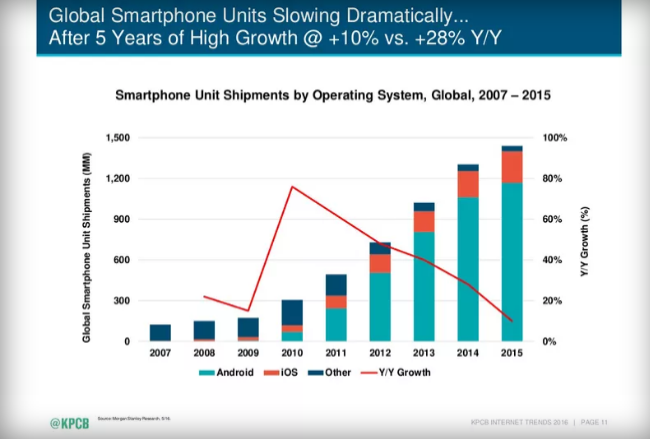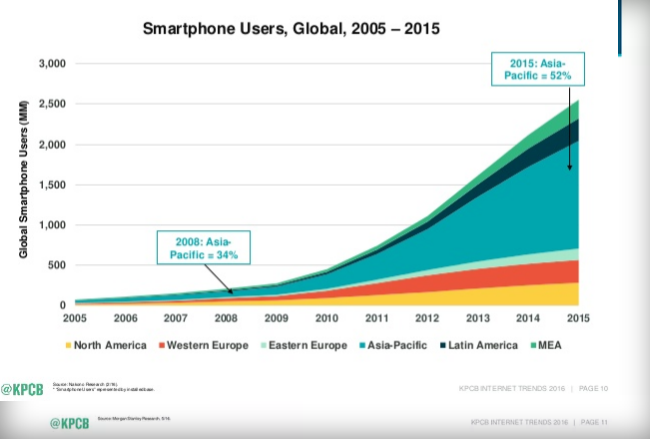Why Apple's IPhone 7 Release Changes Little In The Smartphone Market
Apple (AAPL) recently announced the iPhone 7, which you can pre-order now. The basic cost is $649, and dependent on the carrier you choose, your monthly payment could vary. The phone packs in some interesting new features which I will review here. While the smartphone technology is advancing, very little is expected to change in the mobile market as the result of the new iPhone features. Apple will continue to dominate profits in the area, while Android will continue to dominate in the overall number of handsets in production. Users will have a growing choice of options, and finally I have decided to stop using iPhone products.
Apple currently dominates with 92% of smartphone market profits. This is more astounding when you consider that Android (phone OS owned by Google) dominates the market share in terms of phones sold. See graph (courtesy of KPCB):

Growth rates have indicated that smart phone saturation is neigh. Currently, $5 billion people have some form of smart phone. Or perhaps some of those people have multiple models of different smart phones. Either way, there isn't a whole lot of room for growth.

Apple must be doing something right with their iPhones. While various manufacturers of Android-based phones are fighting a brutal price and features war, Apple strolls along calling it's own design shots while raking in the cash. Simply put, Apple has seemingly been able to command outrageous premiums compared to the market and staying out of the fray of price decreases that have characterized Android's dominance of mobile market growth.
It is easy to see why the iPhone is so profitable. While many smartphone manufacturers allow external memory to be added at whatever costs the market currently offers them at, Apple asks $100 for each additional 100GB of memory. Want the top of the line iPhone 7? Well, then you just spent $200 more because the iPhone doesn't allow external memory to be added. Other manufacturers not only cannot charge that type of premium for a simple memory upgrade, they often lose memory sales to the plethora of memory manufacturers in the market that are busy bidding down the price of memory to the consumer.
The biggest 'feature' of the new iPhone 7 is the lack of a headphone slot. Instead, iPhone users must plug their headphones into the lightning charging port. Users have three options: use the cheap headphones included with purchase, use a lightning adapter to headphone converter, or purchase Apple's $159 wireless earbuds. Yep, $159. How much of that accessory is pure profit to Apple? Wireless headphones have been out for quite some time and prices are nowhere near that high on similar competitor models that do the same thing, albeit on non-Apple hardware.
Right after Apple's unveiling of the iPhone 7, Belkin announced a $40 adapter that would allow users to use their headphones and charge their phones at the same time via the lightning port. $40 extra just to do what existing iPhone 6 and Android users can already do for free? This is a tidy profit for Belkin or whatever other manufacturers opt to provide iPhone 7 accessories. But don't worry about Apple, who gets licensing fees from other manufacturers who want to offer 'official' licensed accessories that will work on the iPhones, known colloquially as the 'Apple tax'. Apple even went as far, on earlier models of the iPhone, to add software that would disallow cheaper Chinese versions of chargers that would work on the iPhone 6. You see, Apple doesn't want anyone infringing on the profits of accessory sales without paying them a nice fee.
To be fair, Apple claims the elimination of the headphone jack will allow more room for battery upgrades and other components to make the phone more powerful and sleek. That is a good reason, but I am sure built-in profits are another. You see, as smart phone sales begin to wane, Apple needs to keep profits strong to please shareholders. Makers of Android-based phones will have a harder time as they compete against one another for a saturated customer base. This will force them to include more features at cheaper prices, and accessory manufacturers will continue to steal the profits from Android phone makers.
Other upgrades for the iPhone 7 include expansion to 3GB of ram, aiding power users who often have multiple phone apps open at once. In addition, Apple now offers two versions of black to go with various gold or silver options. How nice. Also, the antenna is no longer visible on the outside and is built smoothly into the existing case. Wait, don't pretty much all other smart phone manufacturers already do that?
I expect Apple to continue to dominate the profits while allowing the others to scrap out market share gains at the expense of margins. This means that while smart phone adoption is slowing, Apple should continue to build up ample profits for the next few years. This is good, since their iPad sales are fairly anemic, and they haven't upgraded their personal computer line in what seems like ages. Most industry observers expect new laptop models out by the end of the year, perhaps by the holiday shopping season. This will be another nice boost to Apple profits after iPhone 7 begins shipping units. More of the same, in other words.
Overall, I have decided my next phone will be an Android. This is mainly because my daughter's iPhone 6 just died. Despite paying extra for insurance, I spent the last two hours on the phone trying to get support while the Apple Care representative brilliantly told me to update my software. Gee, why didn't I think of that! Perhaps it is because the phone will not turn on?
At the end of the day, smart phones have become ubiquitous. After two years, most people upgrade anyway. If we are all going down that route, then I have decided to join the endless legions of Android users who purchase phones for their favorable cost/benefit ratio. No longer will I line the pockets of Apple shareholders and employees with my dollars. Why do that, when I can still use my existing after-market headphones, upgrade as often and carelessly as I want, get most to all of the features Apple offers on their smart phones, and pay much less?
And Apple will still roll along making lots and lots of money. Not much will change. If you are an Apple investor, you don't have much to worry about for the next 2 years at least. Then, after seeing how the market adopts the iPhone 7 and whether Apple will update it's personal computer line sometime in the next year, we can talk about how Apple has lost it's edge. Until then, you may fearlessly carry on as planned!
The author is not invested in any funds mentioned in the article.



